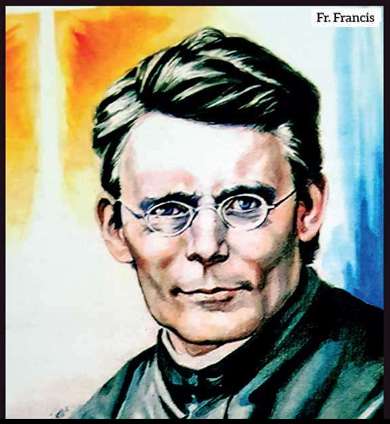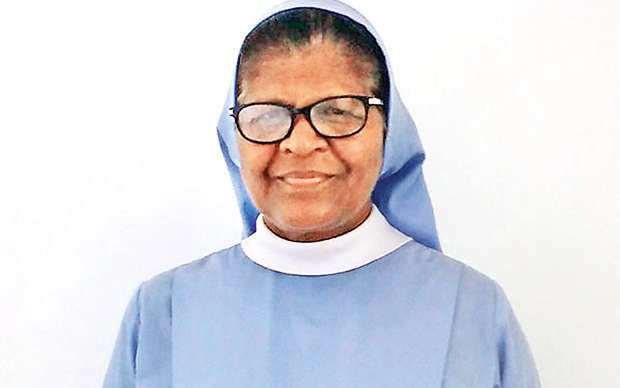Reply To:
Name - Reply Comment


The history and spiritual heritage of the Sisters of the Divine Saviour is closely linked to that of the Society of the Divine Saviour Founded by Venerable Fr. Francis Mary of the Cross Jordan (John Baptist Jordan) in 1888, in Tivoli, Italy. Together with him Blessed Mary of the Apostles (Maria Theresa von Wullenweber) founded the Sisters’ Congregation seven years after the establishment of the Society of the Divine Saviour (Salvatorian Fathers).

The Servant of God, Francis Mary of the Cross Jordan, was born on June 16, 1848, into a poor family in the village of Gurtweil near Walds hut in Baden, Germany. The son of Lorenz and Nothburga, he was the second of three brothers. The next day he was baptised and given the name John Baptist. Around the age of 13 he received his First Holy Communion. The loss of his father at the age of 15 reinforced even more his spiritual life.
After his priestly ordination on July 21, 1878, he was sent to Rome by his bishop where he studied Syrian, Armenian, Coptic, Arabic,Hebrew and Greek. He also visited the Holy Land and Lebanon, during which, he was deeply moved by the words of the Gospel, “This is eternal life, to know You the one true God, and Jesus Christ whom You have sent”(John 17:3), he grew increasingly certain that he was being called to found an apostolic movement.
Fr. Francis Mary managed to gather around himself many spiritual sons and daughters. He wanted his motherhouse in Rome to be a “School for Apostles”-who would later form many new apostles. In 1893, he gave his religious communities the names “Society of the Divine Savior” and “Congregation of the Sisters of the Divine Savior.” In 1915 the First World War forced the Generalate to relocate to neutral Switzerland, and in accord with the decision of the third General Chapter, Fr. Jordan transferred the administration of the Society to his future successor, Fr. Pancratius Pfeiffer. After a serious illness Fr. Jordan died on September 8, 1918, in a humble hospice for the aged in Tafers near Freiburg in Switzerland.
He is the model of an apostle and a missionary, filled with the zeal to lead all to Jesus Christ, the Savior of the world. In his universal vision of the apostolate he wanted not only to promote a renewal of the faith of those who believe, but also at the same time to promote the first and new evangelization. In all areas of life and culture he wanted to proclaim Christ and to give witness “using all ways and means the love of Christ inspires.”
His adult character begins to emerge: diligent, focused, and single-minded. We have also caught glimpses of his future spirituality: hunger for personal holiness, zeal for souls, universality, and trust in Divine Providence. Slowly but surely a vision was forming in Jordan’s heart: to save souls—all souls—everywhere—in the zealous spirit of the apostles. The next steps, his relocation to Rome and his journey to the Middle East, would be decisive for the young Founder.

The purpose of this society is, with divine grace, to care not only for personal salvation, but by the same grace, all over the world, where the greater glory of God demands it, to follow the command of Our Lord Jesus Christ: “Go forth and teach all nations.” That demands, by teaching and education, by instruction in word and print, being engaged even to the point of exhaustion so every intelligent creature will increasingly know the true God and the one He has sent, Jesus Christ, and that he will live a holy life and save his soul.
Jordan laid out for Lüthen and Mother Mary a breathtaking vision of the apostolic work to be done: that all people everywhere come to know the one true God and Jesus Christ whom God had sent; that the one true church be strengthened, defended and spread throughout the world; that we achieve our own salvation and the salvation of many souls; and that we enlist the talents of all, clergy and laity, in this one great effort to the glory of God. This remains even today the common mission of all who call themselves Salvatorians.
Salvatorian Sisters with the zeal of their beloved founder arrived in Sri Lanka in 1954. Today fulfilling the vision of their beloved founder giving hope and life to the people in the periphery they are serving in seven dioceses. Salvatorian Sisters from Sri Lanka are serving in Pakistan, Jordan and Emmaus. Salvatorian Fathers arrived in Sri Lanka in 2005 and serving in two dioceses Chilaw and Jaffna. The Lay Salvatorian Committed members are widely spread especially where the Salvatorians are present and actively participate in the apostolic commitment according to their state of life.
In conclusion, we must again review Jordan’s life and accomplishments, and examine more closely the relationship among the pillars of his apostolic spirituality: obedience, poverty, suffering, prayer, and reliance on Divine Providence.